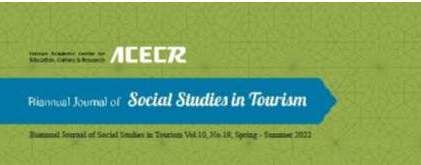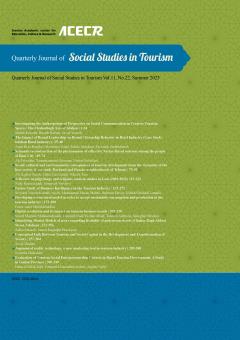Semantic reconstruction of the phenomenon of collective Nature-Based tourism among the people of Ilam City
Subject Areas :Ali Feizolahi 1 * , yarmohammad ghassemi 2 , farhad sabzifard 3
1 -
2 -
3 -
Keywords: Tourism, Collective Tourism, Ecotourism, Nature-based Tourism, Ilam,
Abstract :
This qualitative study sought to identify the causes and effects of the phenomenon of collective nature-based tourism among the people living in Ilam City using the grounded theory method. The population of the study comprised all residents of Ilam City in 2019, among whom twenty-four people were selected through purposive sampling until theoretical saturation was reached. The required data were collected via semi-structured in-depth interviews, which were then analyzed using open, axial, and selective coding. In the open coding stage, 928 semantic propositions and 157 basic concepts were identified, which were then categorized into 27 axial categories in the axial coding stage. Finally, the core category was identified based on the content analysis of the axial categories identified in the previous stage. The findings of the study indicated the effective role of causal conditions, curiosity, psychological reinvigoration, nostalgia, and conspicuous consumption on the spread of collective nature-based tourism. Moreover, it was found that contextual conditions, including environmental and climatic conditions, economic status, family background, holidays, and spatial belonging on the one hand, and intervening conditions such as the lack of leisure facilities in the city, and temporal and gender limitations on the other hand, were also involved in such a phenomenon. On the other hand, the findings revealed that the people living in Ilam opted for health-oriented, taste-oriented, culture-oriented, and destructive interactions and strategies while trying to improve social relations. In general, the core category of "collective nature-based tourism as a manifestation of opportunities and threats" was extracted from the content analysis of axial codes, indicating that this kind of tourism creates opportunities for individuals to improve their mental and emotional well-being and social life and strengthen their solidarity. However, it can bring about some threats to nature, including its destruction which may be caused by dumping waste, deforestation, and hunting.
استراوس، انسلم و کربین، جولیت (1397). مبانی پژوهش کیفی. ترجمه ابراهیم افشار، چاپ هفتم، تهران: نشر نی.
انصاریرنانی، قاسم و جلالی، فرشاد (1386). عوامل مؤثر بر استقبال مردم تهران از طبیعتگردی (اکوتوریسم). مجله مطالعات مدیریت (بهبود و تحول)، 14(53)، 50- 25.
تیموتی، دالنجی (1388). جامعهشناسی مصرف (گردشگری و خرید). ترجمه مهدی حسینآبادی و علیاصغر سعیدی، تهران: جامعهشناسان.
داناییفرد، حسن و امامی، سیدمجتبی (1386). استراتژیهای پژوهش کیفی: تأملی بر نظریهپردازی دادهبنیاد. فصلنامه اندیشه مدیریت راهبردی (اندیشه مدیریت)، 1(2)، 97- 69.
رحیمیمقدم، جواد و ناظری، احسان (1392). امکانسنجی توسعه طبیعتگردی در استان ایلام. مجله فرهنگ ایلام، 14 (40 و 41)، 204- 190.
رضویزاده، ندا و سعیدی، علیاصغر(1393). دستاوردهای جامعهشناسی برای مطالعات گردشگری. نشریه راهبرد توسعه، 11(39)، 100 -80.
رنجبریان، بهرام.؛ امامی، علیرضا و غفاری، محمد (1393). رفتار مصرف کننده در گردشگری. تهران: مهکامه.
شاطریان، محسن؛ غلامی، یونس و کیانی، مریم (1396). «جایگاه تصویر ذهنی ساکنان محلی در توسعه گردشگری (نمونه موردی: شهر آران و بیدگل)». فصلنامه برنامهریزی منطقهای، 7 (۲۸)، 134- 121.
شیخزاده، ابراهیم (1394). «مدلسازی عوامل مؤثر در بهبود کیفیت زندگی با تأکید بر تأثیرات توسعه صنعت گردشگری (مطالعه موردی: شهر تهران)». نشریه مطالعات توسعه اجتماعی ایران، 8 (۱)، 65-51.
غفاری، محمد؛ عباسی، احمد و کنجکاو منفرد، امیررضا (1397). «نقش تجربه گردشگر در بهبود تصویر ذهنی مقصد گردشگری اصفهان». فصلنامه گردشگری و توسعه، 7 (۲)، 112- 97.
کاریگان، پیتر (1397). جامعهشناسی مصرف. ترجمه سعید صدرالاشرافی، چاپ دوم، تهران: گل آذین.
کرسول، جان (1391). پویش کیفی و طرح پژوهش (ویرایش دوم). ترجمه: حسن داناییفرد و حسین کاظمی، تهران: صفار- اشراقی.
گی، چاک. وای (۱۳۸۲). جهانگردی در چشماندازی جامع. ترجمه: علی پارساییان و سید محمد اعرابیان، چاپ دوم، تهران: دفتر پژوهشهای فرهنگی.
میرمحمدتبار، سیداحمد؛ نوغانی، محسن و مسلمی، رقیه (1394). «عوامل مؤثر بر نحوه¬گذران اوقات فراغت (فراتحلیلی از پژوهشهای موجود)». فصلنامه برنامهریزی رفاه و توسعه اجتماعی، 7(۲۴)، 194-165.
وبلن، تورستین (1395). نظریه طبقه تنآسا. ترجمه: فرهنگ ارشاد، چاپ پنجم، تهران: نشر نی.
وقوفی یکتا، زهرا (1394). چگونگی تفسیر مردم ایلام از اقدام به طبیعتگردی. پایاننامه کارشناسی ارشد رشته برنامهریزی توریسم، مؤسسه آموزش عالی باختر ایلام.
Cohen, E. (2004). Contemporary tourism- diversity and change. London: Elsevier.
Dorobantu, M. R. (2012). Considerations about Ecotourism and Nature-Based Tourism Realities and Perspectives. International Journal of Academic Research in Economics and Management Sciences, 1(5), 215-221.
Fredman, P., Reinius, S. W., & Grundén, A. (2012). The Nature of Nature in Nature-based Tourism. Scandinavian Journal of Hospitality and Tourism, 2012, 12(4), 289 –309.
Hagerty, B. M.K, Sauer, J. L., Patusky, K. L., Bouwserna, M. & Collier, P. (1992). Sense of Belonging: A Vital Mental Health Concept. Archives of Psychiatric Nursing, 4(3),172-177.
Heintzman, P. (2009). Nature-based recreation and spirituality: A complex relationship. Leisure Sciences, 32(1), 72–89.
Marasinghe, s., Perera, P., Simpsom, G., Newsome, D. (2021). Nature-based tourism development in coastal wetlands of Sri Lanka: An Importance Performance analysis at Maduganga Mangrove Estuary. Journal of Outdoor Recreation and Tourism,33, 1-12.
Margaryan, L. (2017). Commercialization of nature through tourism. Doctoral Dissertation, Mid Sweden University.
Olafsdottir, G. (2013). on nature-based tourism. Tourist Studies, 13(2)127–138.
Perera, P., Vlosky, R. P., & Wahala, S. B. (2012). Motivational and behavioral profiling of visitors to forest-based recreational destinations in Sri Lanka. Asia Pacific Journal of Tourism Research, 17(4), 451–467.
Swarbrooke, J., Horner, S. (2007). Consumer Behavior in Tourism. Butterworth-Heinemann.

